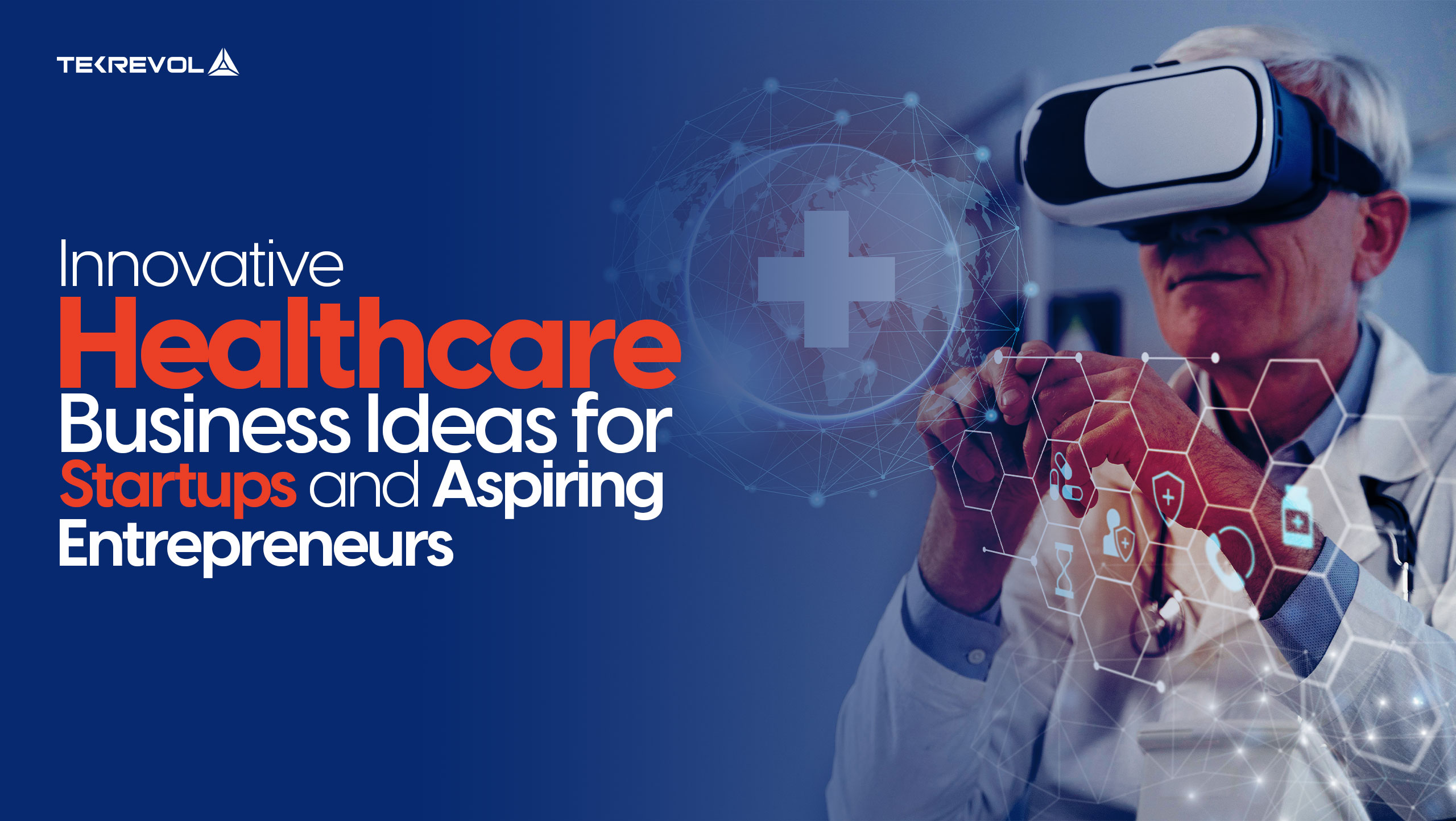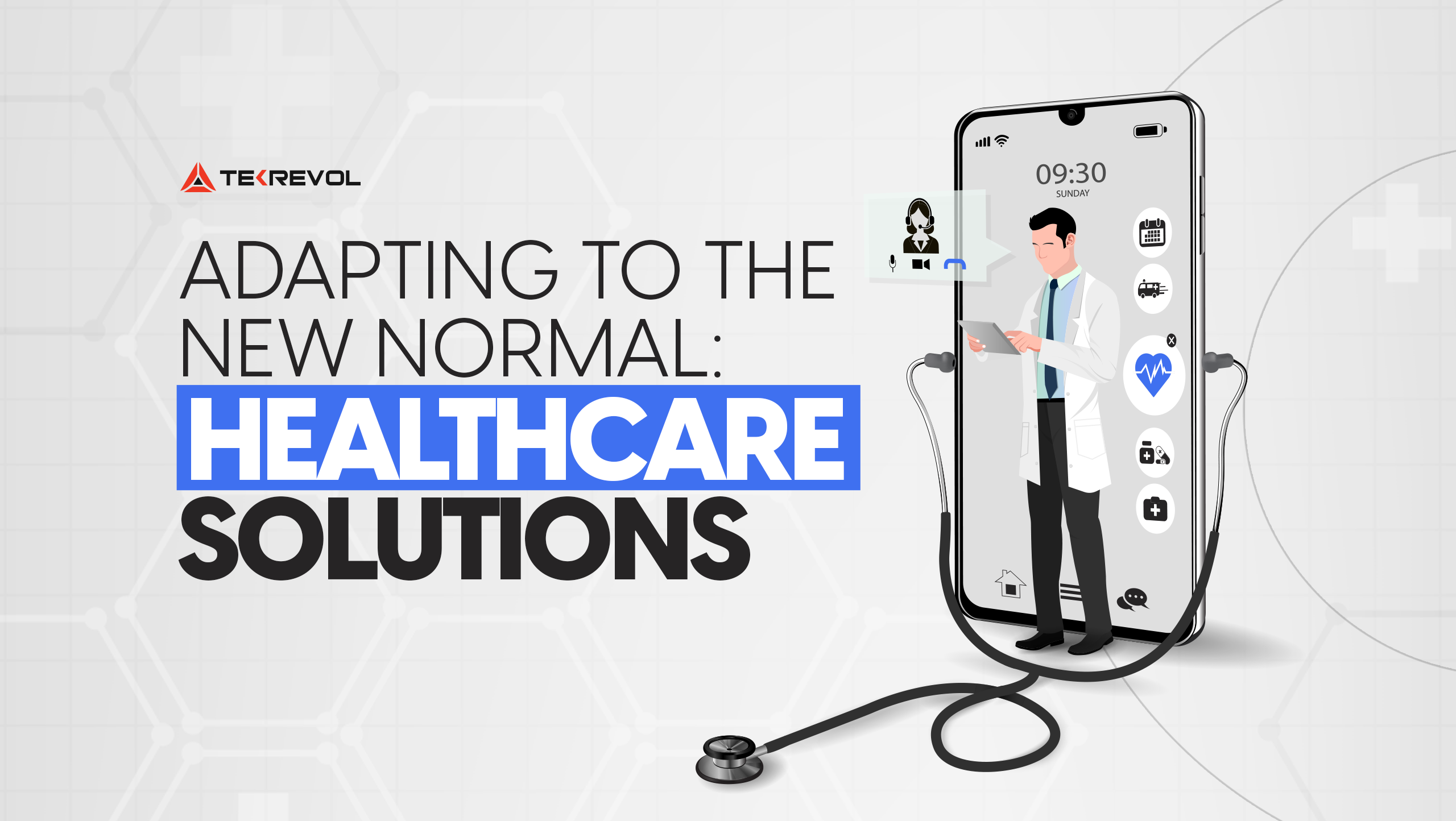Healthcare has been here for centuries. Yet, this is one of the few industries that will never run out of demand. At least as far as there are humans on this planet or until aliens take over us. The global healthcare industry is a behemoth, projected to reach $520.6 billion by 2032, according to a report by GLOBE NEWSWIRE.
The COVID-19 pandemic accelerated the growth of this sector, and there is no stopping anytime soon. According to Deloitte, global healthcare supply chain management is expected to grow at a CAGR of 9.4% from 2020 to 2027. Every year, hundreds and thousands of healthcare startups are launched, contributing to this upward surge.
If you’re an entrepreneur or an aspiring innovator looking for innovative healthcare business ideas to build upon, this blog serves as a comprehensive guide for you. This blog discusses everything you need to learn about your next healthcare venture, from identifying lucrative opportunities to overcoming challenges and achieving success.
What Makes Healthcare a Lucrative Market?

The health sector remains one of the most in-demand and profitable industries since it serves a basic human need. With the recent shift to personalized care, digital health solutions, and innovations in the field of medicine, this is a very huge business market for entrepreneurs.
Moreover, the industry’s resilience to economic downturns and its ability to adapt to changing demographics and technologies make it an attractive bet for long-term growth.
Increasing Demand
Healthcare startups are seeing an unprecedented rise in demand due to multiple factors. The worldwide aging population, insufficient infrastructures for healthcare globally, and a sharp increase in chronic diseases propel the demand for more new healthcare services.
With all the disruption caused by the pandemic, gaps in the traditional system of healthcare called for urgent solutions in a digital health area, namely telemedicine and remote patient monitoring. These transitions demand innovative startups that address an emerging healthcare need with far more accessible and efficient solutions.
Technological Advancements
Technology is now changing approaches towards healthcare. Innovations in the world of healthcare have changed approaches to both diagnosis and treatment. Innovations like Personalized Medicine and Virtual Reality therapy are now a reality.
These advancements not only improve patient care but also open up new business opportunities. Entrepreneurs can leverage these technologies to disrupt traditional healthcare models and create more efficient, accessible solutions.
Sustainable Growth with Competitive Edge
Healthcare is a booming industry. Domains like pharmaceutical and biotechnology and medical supplies have been in demand for decades and will continue to do so. Moreover, the post-pandemic healthcare sector brings enormous demand for innovation, which has led to the rise of health-based startups.
Startups entering the healthcare market can gain a competitive advantage by being early adopters of new technologies and trends. This first-mover advantage allows them to establish a strong market presence and capitalize on emerging opportunities.
- Launch Your Healthcare Startup Today!
- Partner with a leading healthcare app development company to build a custom, scalable, and secure app that meets your business needs.
Top 15 Innovative Healthcare Startup Ideas
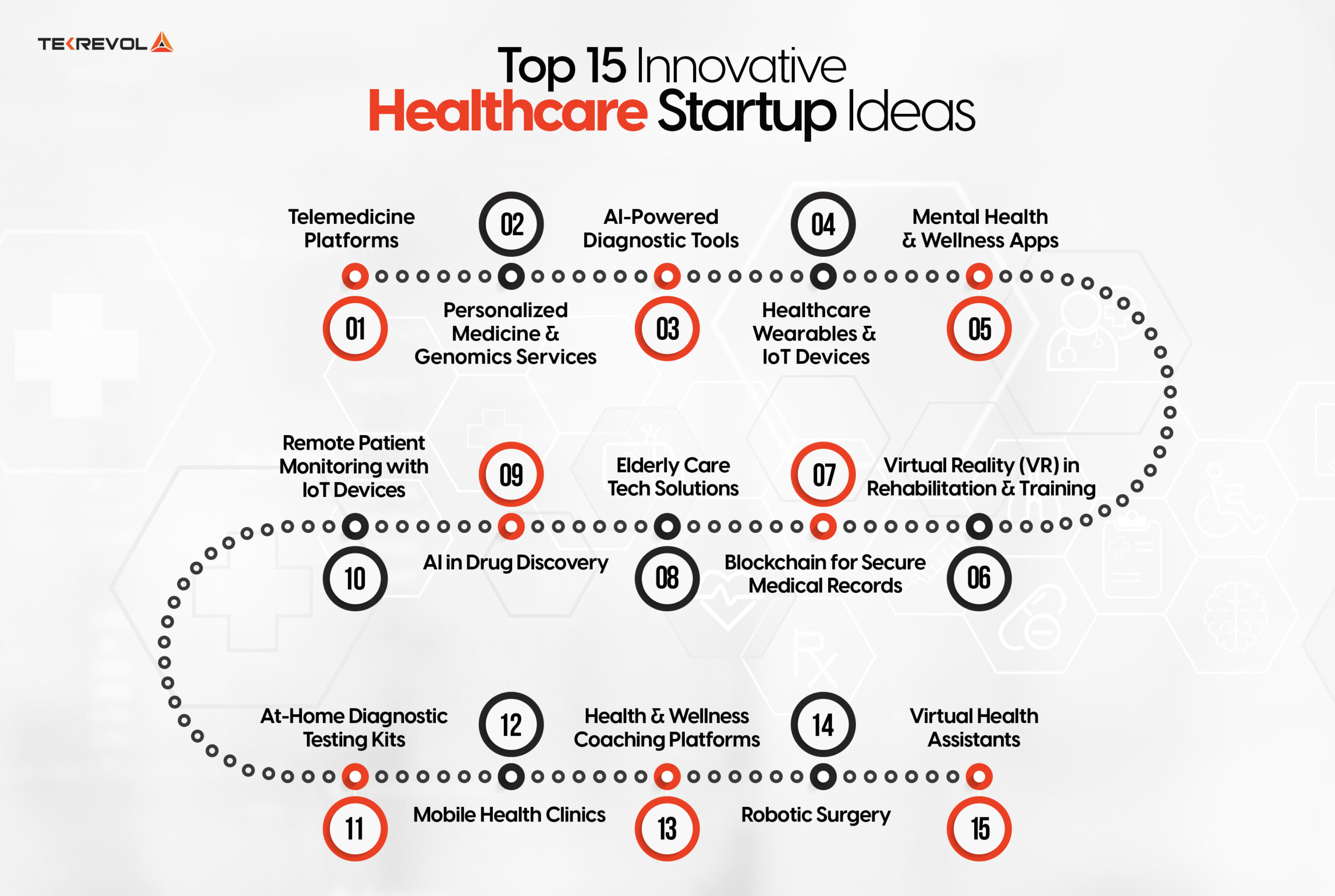
1. Telemedicine Platforms
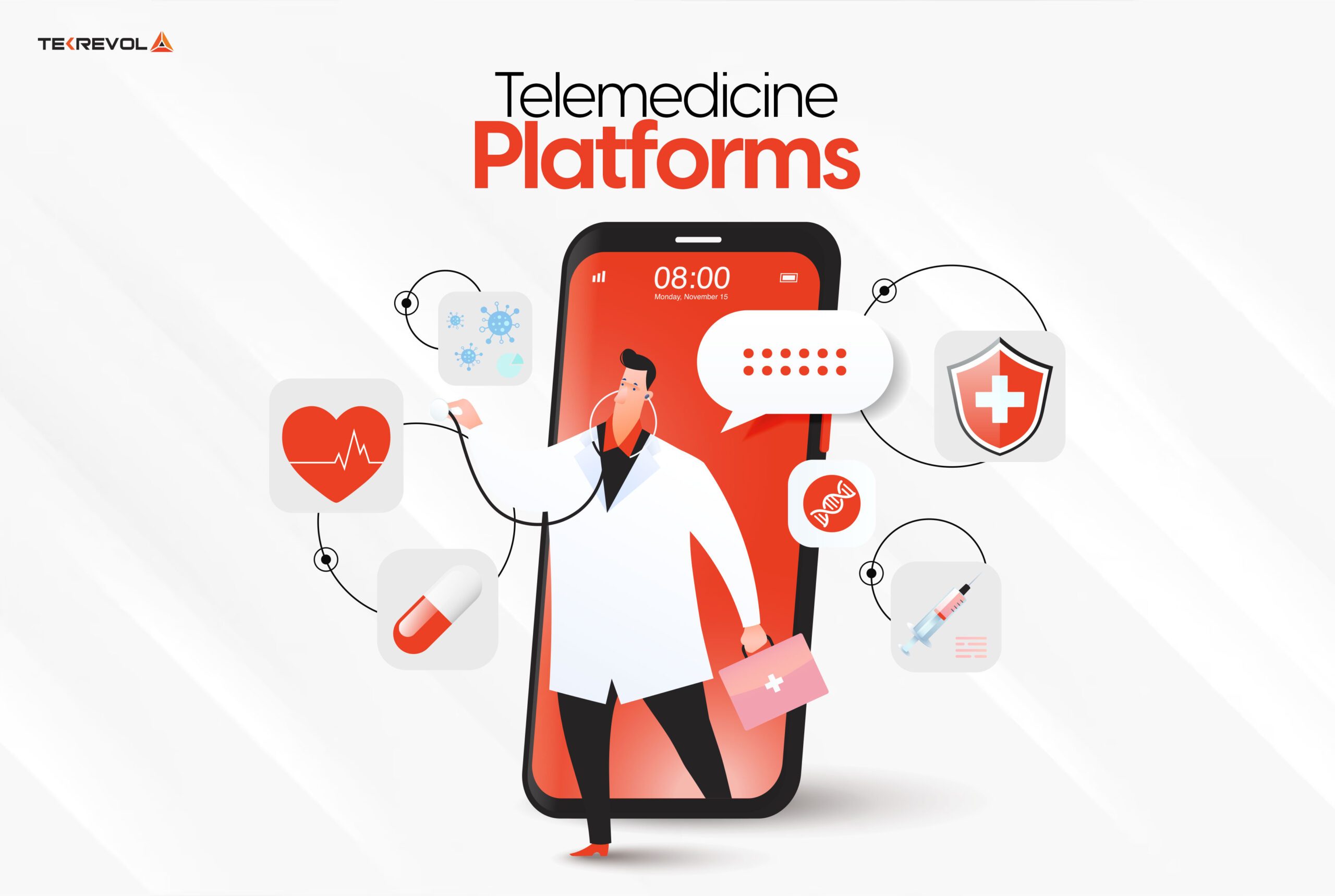
Telemedicine platforms have changed the face of healthcare since it has become possible to deliver medical services more accessible and convenient. This involves video calls and secure chats so that patients can easily interact with healthcare providers within their homes. The fact that there is reduced necessity for physical visits besides enhancing the coverage of health care services to the most remote areas.
As more people seek convenient and efficient healthcare options, telemedicine platforms are well-positioned to capture a significant market share, offering entrepreneurs a scalable and profitable business opportunity.
Target Audience
Telemedicine is suited for various kinds of people. They are ordinary people in need of regular consultation by a doctor, patients who are suffering from chronic conditions, those living in the countryside with limited access to hospitals and healthcare amenities, and urban dwellers who save them precious time needed while traveling.
Success Stories
- Teladoc Health: Offers a variety of virtual healthcare services, including access to doctors, therapists, and dermatologists.
- American Well (Amwell): Partners with top health systems and insurers to provide comprehensive telemedicine solutions.
- Doctor on Demand: Provides a user-friendly platform for virtual consultations with board-certified physicians and psychiatrists.
Market Outlook
Telemedicine market is estimated to reach $460 billion by 2030. Increasing acceptance and reliance on virtual healthcare solutions have led the industry to this growth; hence, telemedicine is an excellent area for startups.
2. Personalized Medicine and Genomics Services
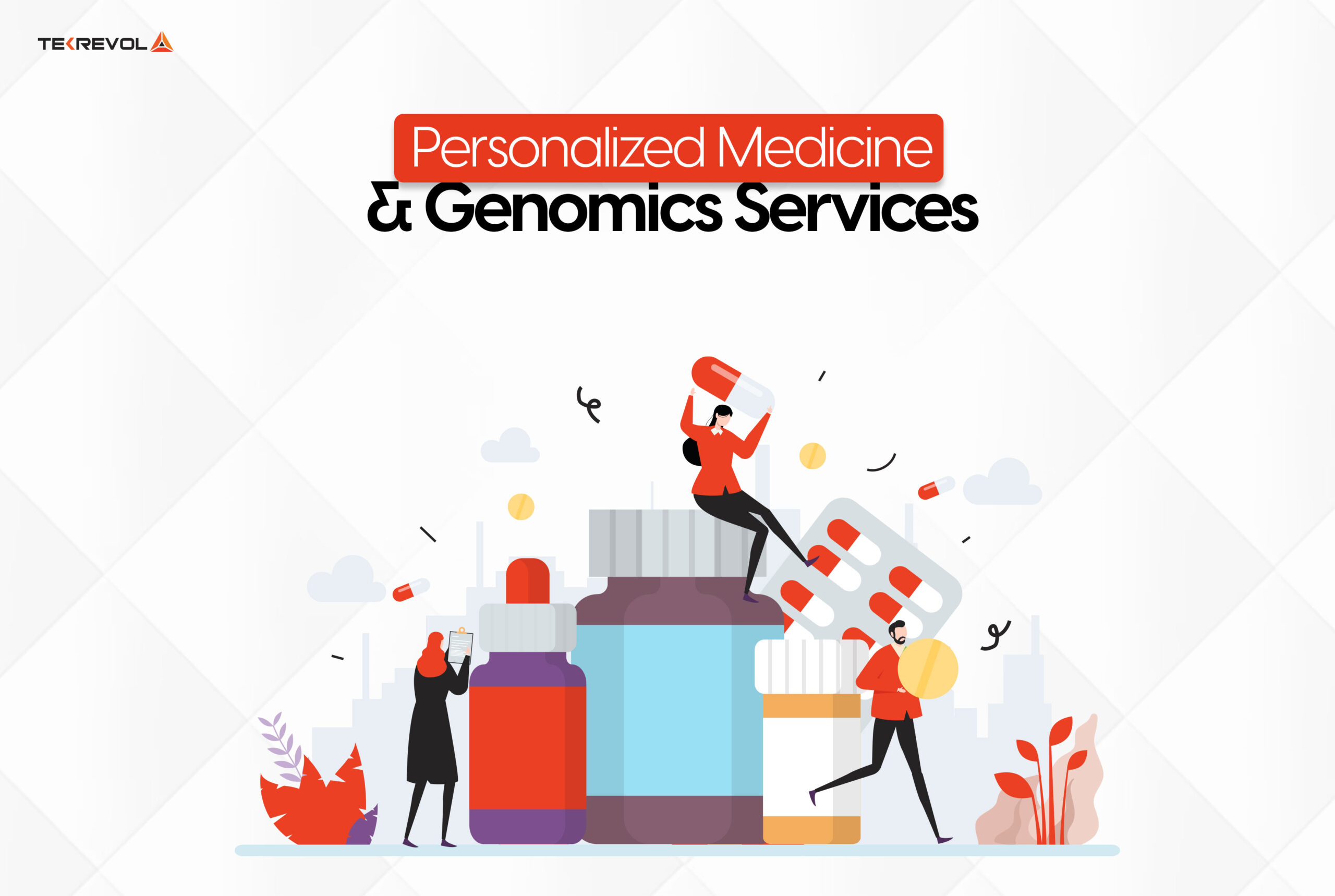
Personalized medicine is changing the way healthcare is delivered by using genetic information to tailor treatments to individual patients. This approach is currently becoming very popular as everyone is looking for better healthcare solutions. Genomics advances mean that the treatments can be directed toward a person’s genetically unique makeup, lifestyle, and environment.
As the demand for personalized health care continues rising, this business can give a startup an edge in terms of the competitive market in which they operate and allow them to ensure a steady customer base to work with, making the healthcare startup idea very lucrative for startups.
Target Audience
This is ideal for all patients with treatments that cut across different genetic profiles and those people interested in determining their potential genetic health risk. Ideally, it offers an excellent opportunity for a healthcare provider to offer precision medicine.
Success Stories
- 23andMe: Direct-to-consumer testing into ancestry and health risks.
- Foundation: Medicine Precision Oncology: genomic profiling to guide cancer treatment
- Color Genomics: Affordable genetic testing for hereditary health risks, bringing personalized medicine within reach for more
Market Outlook
The personalized medicine market will account for $527 billion by 2027 and grow at a compound annual growth rate of 12.5%. Growth in the market is led by the demand for healthcare solutions that are individually tailored.
3. AI-Powered Diagnostic Tools
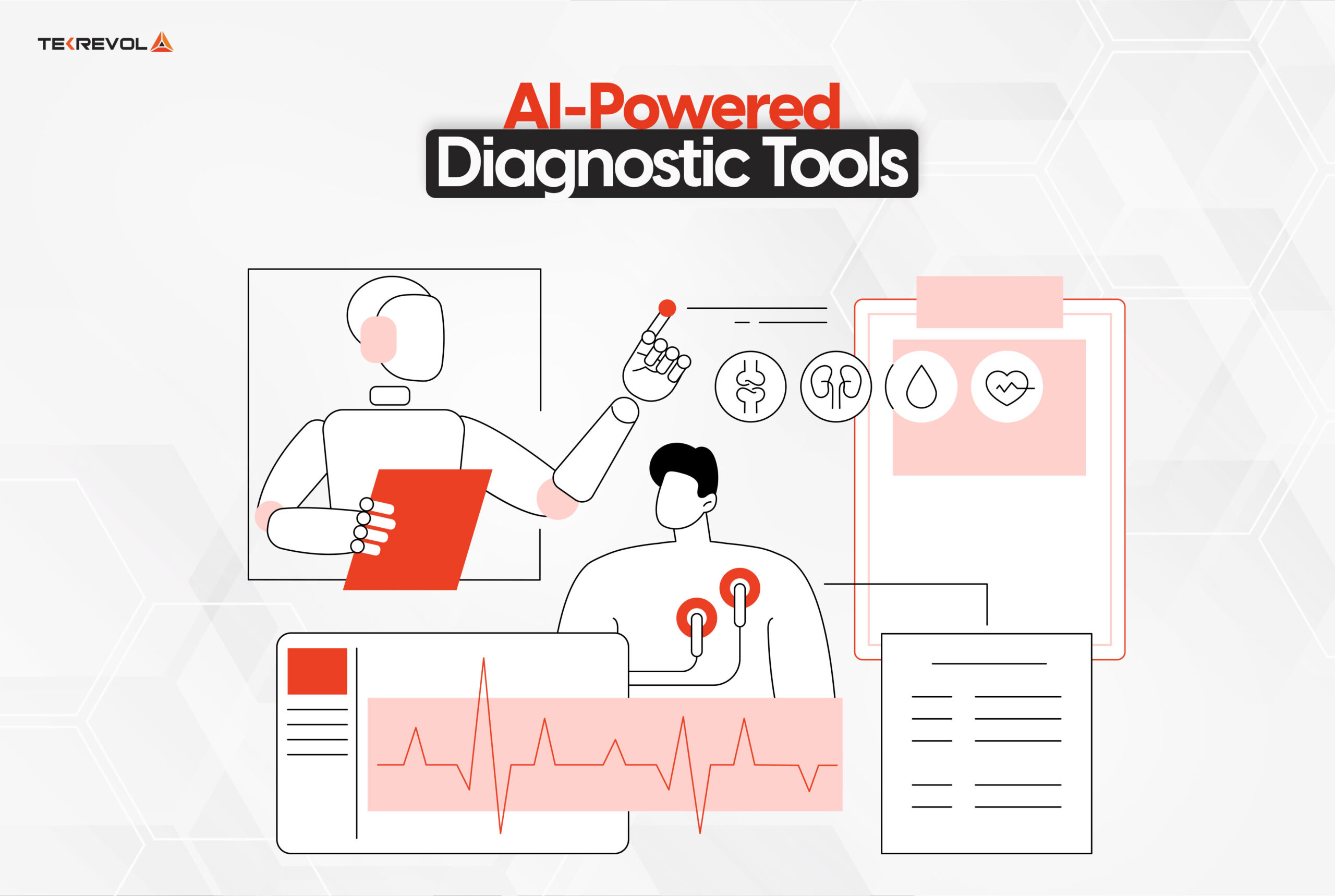
If you thought AI was only for replacing redundant tasks and automating processes, think again. Now, AI-powered diagnostic tools are changing healthcare by reading medical data and images with a precision that is nothing short of phenomenal. Doctors make better decisions with the help of these diagnostic tools and reduce errors in diagnosis, making them important in modern healthcare.
As healthcare providers increasingly adopt AI solutions, startups in this field can benefit from partnerships and collaborations with medical institutions. The technology’s potential to improve patient outcomes and streamline healthcare processes makes it an attractive business opportunity.
Target Audience
These tools are valuable for healthcare providers looking to improve diagnostic accuracy, patients who need quick and reliable diagnoses, and medical facilities aiming to enhance their diagnostic capabilities.
Success Stories
- Zebra Medical Vision: A company building AI solutions from medical imaging in partnership with leading healthcare providers.
- Aidoc: Provides FDA-approved AI to radiology services that are used to aid in diagnosing acute abnormalities.
- PathAI: This company gets very large funding from its investors to support the usage of machine learning in pathology.
Market Outlook
AI in Healthcare Market will reach $146.5 billion by 2029, growing at a CAGR of 39.6%. Such a high growth rate indicates the area of opportunities for the development of diagnostics with AI, which is a lucrative area for startups.
4. Healthcare Wearables and IoT Devices
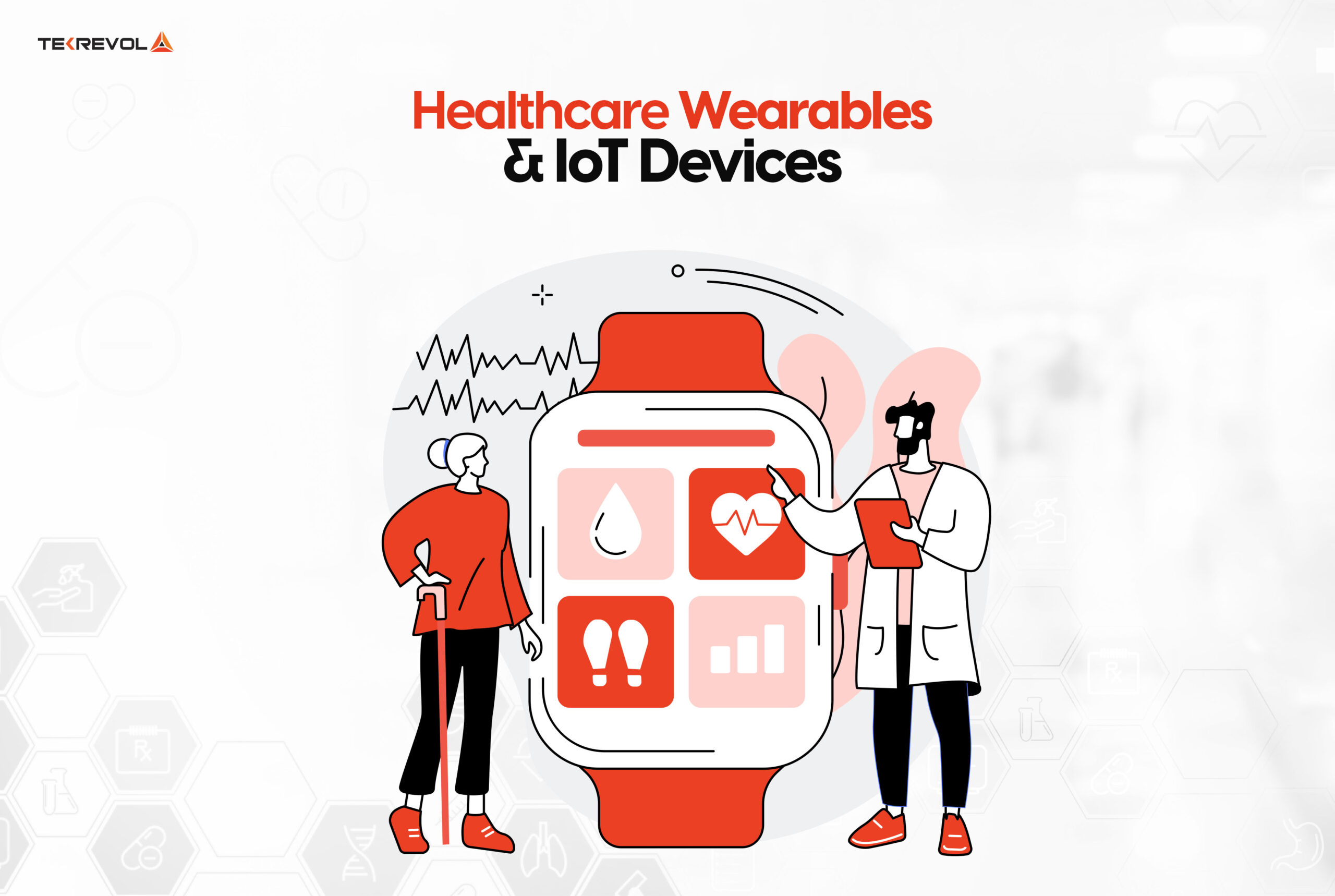
Wearables are a hot trend these days. Famous brands like Fitbit and Apple Watch are leading the way in helping people monitor their health in real-time. The devices monitor heart rate, sleep patterns, and all that and provide insights that prompt proactive health management.
The wearables market offers a great business opportunity since customers are increasingly looking for health and wellness monitoring. Business innovation in products can easily become part of the routine for businesses, thereby gaining a huge, scalable market and a strong brand position.
Target audience
Wearable devices are for interested groups in monitoring personal health, sporty people, and care providers using data to produce proper patient care. Other wearables are for patients having chronic diseases that require consistent follow-up.
Success Stories
- Fitbit: This company is a subsidiary of Google, and it sells wearable fitness trackers and smartwatches measuring various health metrics.
- Apple Watch: A leading wearable device in the market with a top-selling record globally, its leading sales record is attributed to its health features such as ECG monitoring.
- Oura Ring: It is a sportswear tracker that tracks people’s sleep and activity and provides insights into their overall health.
Market Outlook
The market for wearable medical devices is projected to grow to $45 billion by 2024, with a CAGR of 17.3%. This growth is mainly driven by the increasing consumer interest in personal health monitoring and technology integration into life.
- Launch Your Medical Business Now!
- Discover how our expert healthcare app development company can help you build a game-changing MVP in just weeks.
5. Mental Health and Wellness Apps
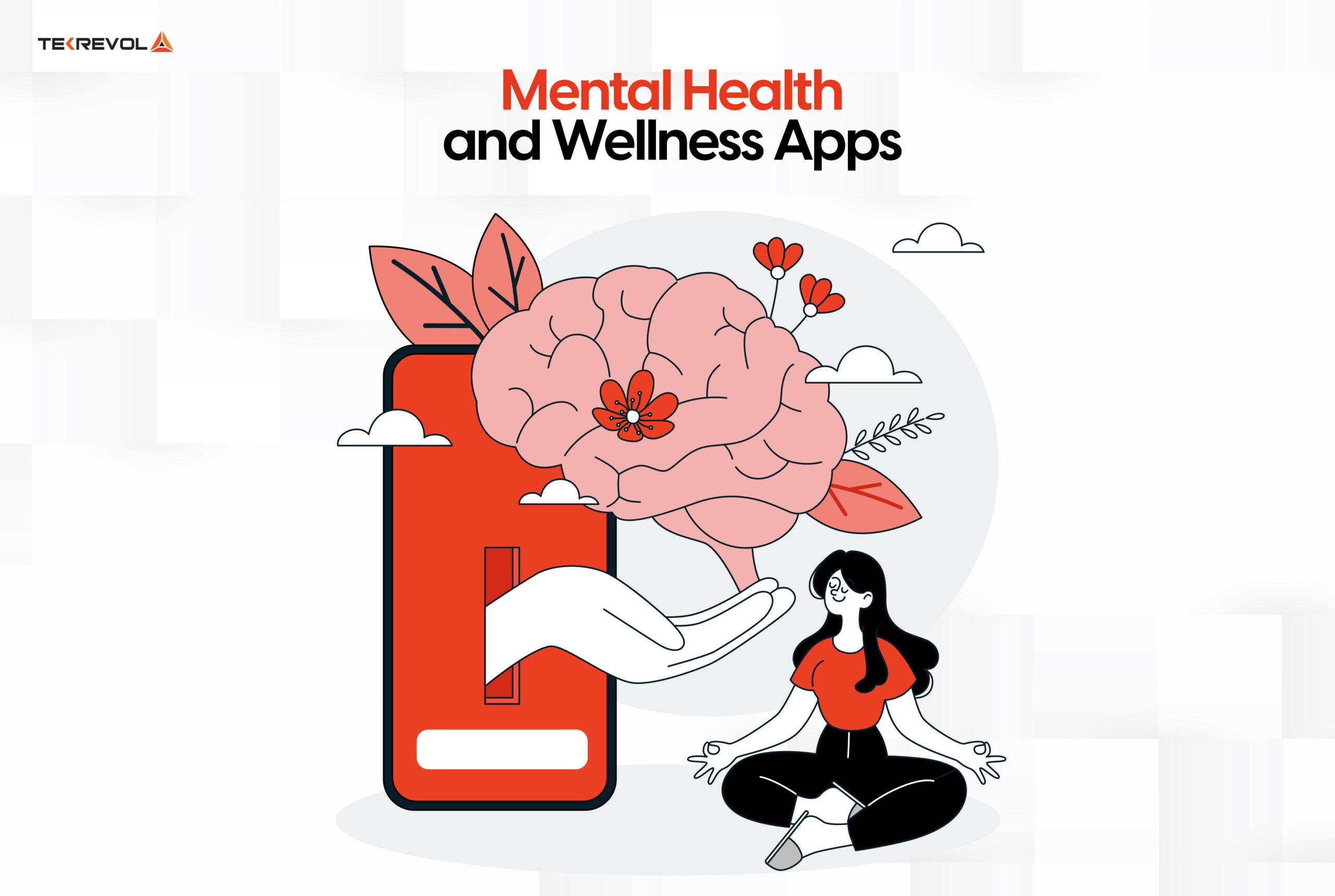
Mental health applications provide accessible support for anyone who needs it, helping individuals meditate, stress, and even therapy through several application platforms. The trend continues to grow because awareness in people regarding mental health issues develops, and people seek inexpensive, convenient solutions.
Since the nature of these applications is digital, they become very scalable and accessible to large numbers of people, hence becoming a great entry opportunity for entrepreneurs into this market, which is socially impactful as well as financially rewarding.
Target Audience
These apps help those who need mental health services, those who want to practice mindfulness and reduce their stress levels, and also corporate entities that wish to offer wellness to their employees. They come in handy to people who would not wish to be seen visiting a therapist.
Success Cases
- Headspace: This offers meditation and mindfulness to reach more than 80 million users across the globe.
- Calm: Guided meditations and sleep stories with over $88 million raised in funding.
- Talkspace: Offers access to licensed therapists through the site and has reached over 1 million members.
Market Outlook
The mental health application market is expected to reach $10.7 billion by 2027, and this will be at an annual growth rate of 17.2%. These growth statistics are a result of increased demand for digital health care in mental health along with acceptance of technology into the world of mental health services.
6. Virtual Reality (VR) in Rehabilitation and Training
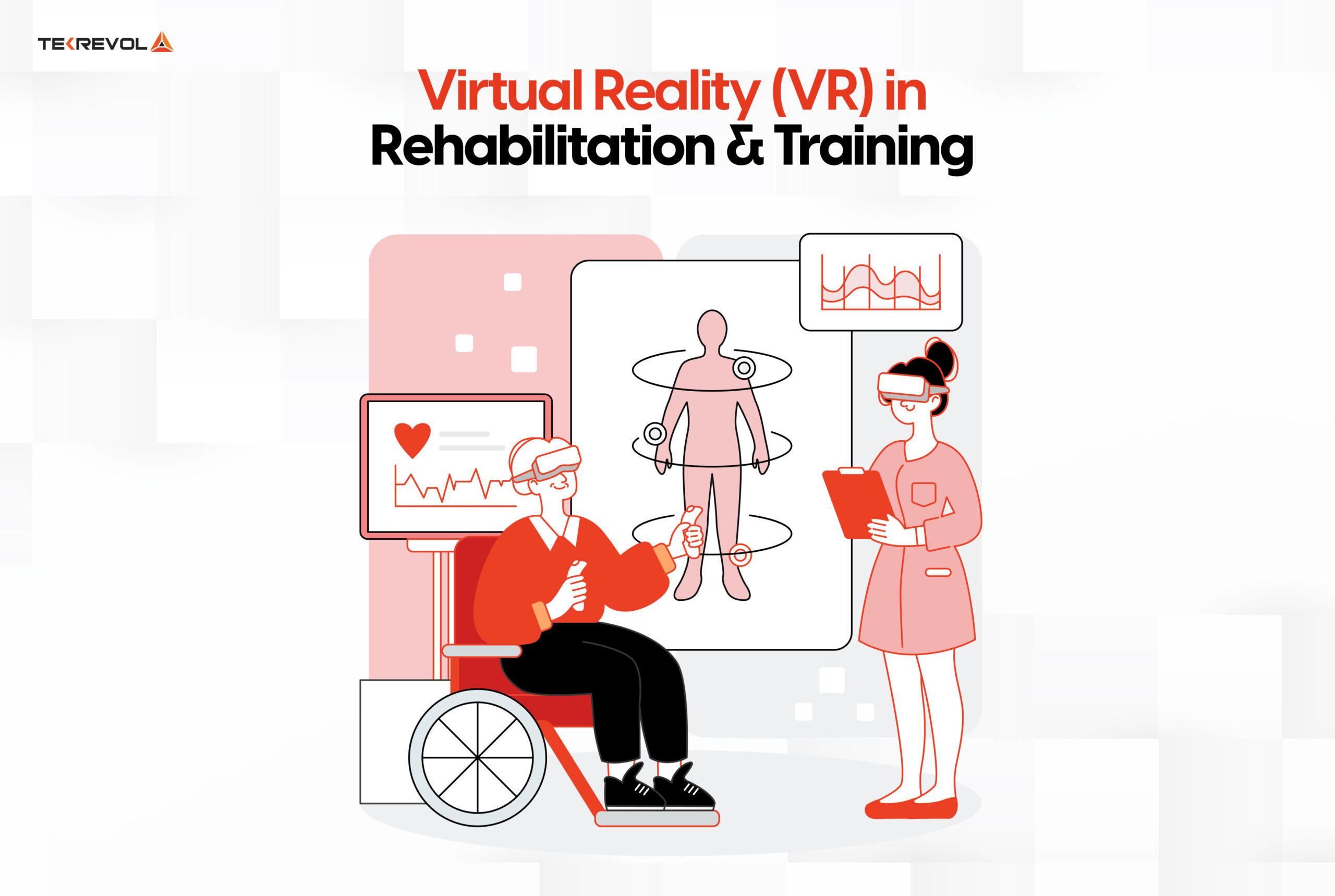
Virtual Reality (VR) is not just for gaming anymore. It’s taking healthcare by storm, giving people an immersive experience in rehabilitation and training. Interactive therapies with VR technology enhance patient engagement and recovery speed.
For a startup, the healthcare arena is a space to innovate and improve patient outcomes. Businesses can capitalize on an expanding market interested in state-of-the-art technology through innovative and effective VR solutions.
Target Audience
The suitable applications of VR solutions can be rehabilitation centers, hospitals, and medical training institutes. They are a beneficial tool for patients going through physical therapy, healthcare providers for additional training, and the healthcare provider themselves, aiming to enhance patient treatment.
Success Stories
- MindMaze: Developing neurorehabilitation-based VR solutions in collaboration with prominent hospitals.
- Osso VR: Offers FDA-cleared surgical training platforms on VR.
- AppliedVR: Developed a range of VR therapies for pain management and patient experiences.
Market Outlook
The VR healthcare market is expected to reach $13.5 billion by 2029 at a CAGR of 32.1%. It is driven by the rise in the adoption of VR in clinical settings and the growing need for novel rehabilitation techniques.
7. Blockchain for Secure Medical Records
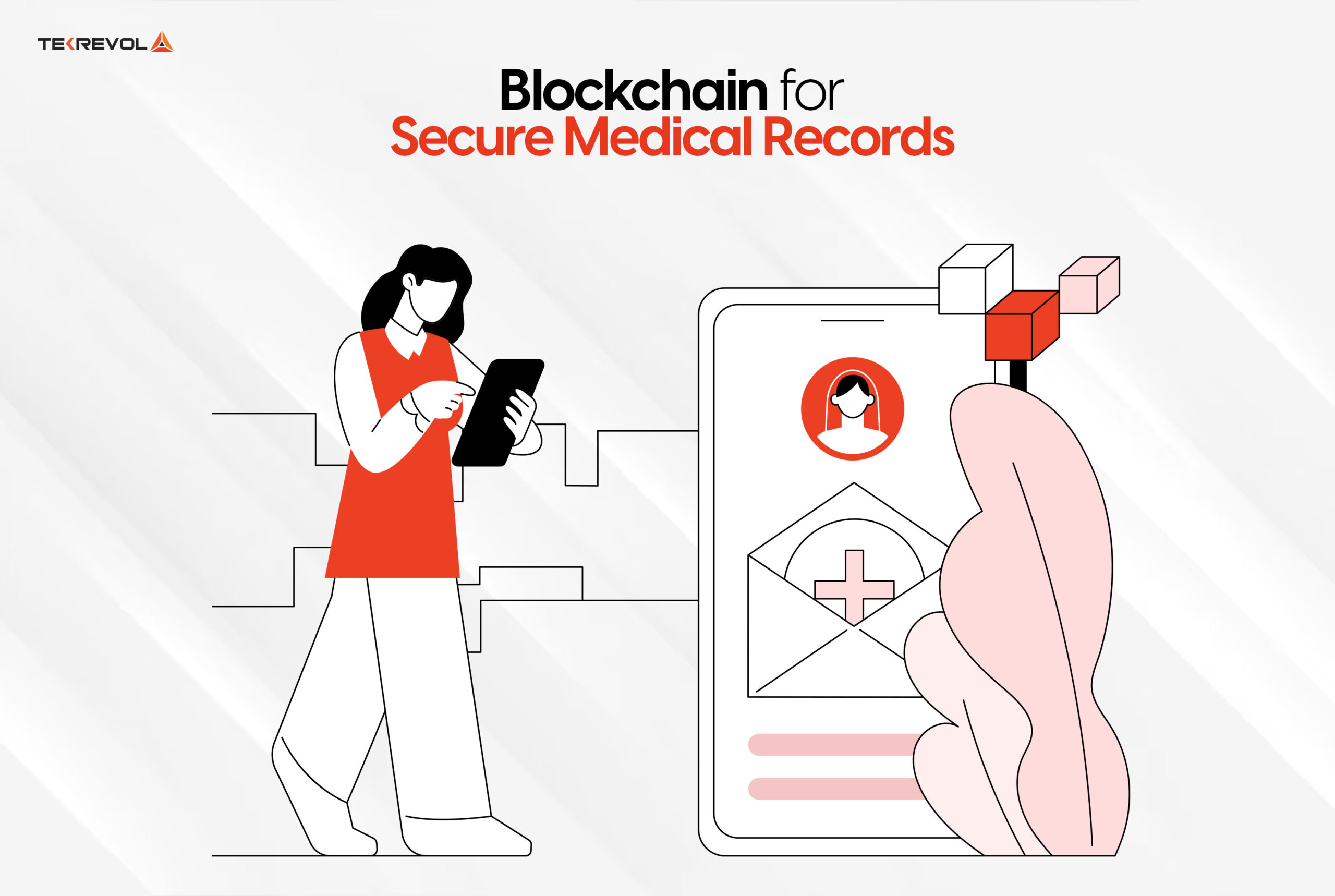
Blockchain technology improves the security and interoperability of medical records. This healthcare startup idea is trending because it is solving data privacy concerns while improving healthcare data management. The potential to streamline record-keeping is what makes blockchain solutions interesting.
Blockchain offers a chance to revolutionize how medical data is stored and shared in the most secure and efficient manner for both patients and providers.
Target Audience
Blockchain solutions would be apt for health providers, hospitals, and insurance companies. It caters to the needs of patients who need to ensure security in accessing their medical history and organizations looking for the improvement of data management and compliance.
Success Stories
- Medicalchain: Uses blockchain technology for secure electronic health records and collaborates with healthcare providers.
- BurstIQ: Blockchain-based healthcare data solutions provider and has received considerable funding.
- Patientory: Offers a patient data management platform safely and has expanded the user base in the healthcare sector.
Market Outlook
The blockchain in the healthcare market is likely to reach a value of $6.1 billion by 2027, growing at 42.5% of CAGR. This denotes the growing demand for assured data management solutions and the potential of blockchain technology in the overall healthcare space.
8. Elderly Care Tech Solutions
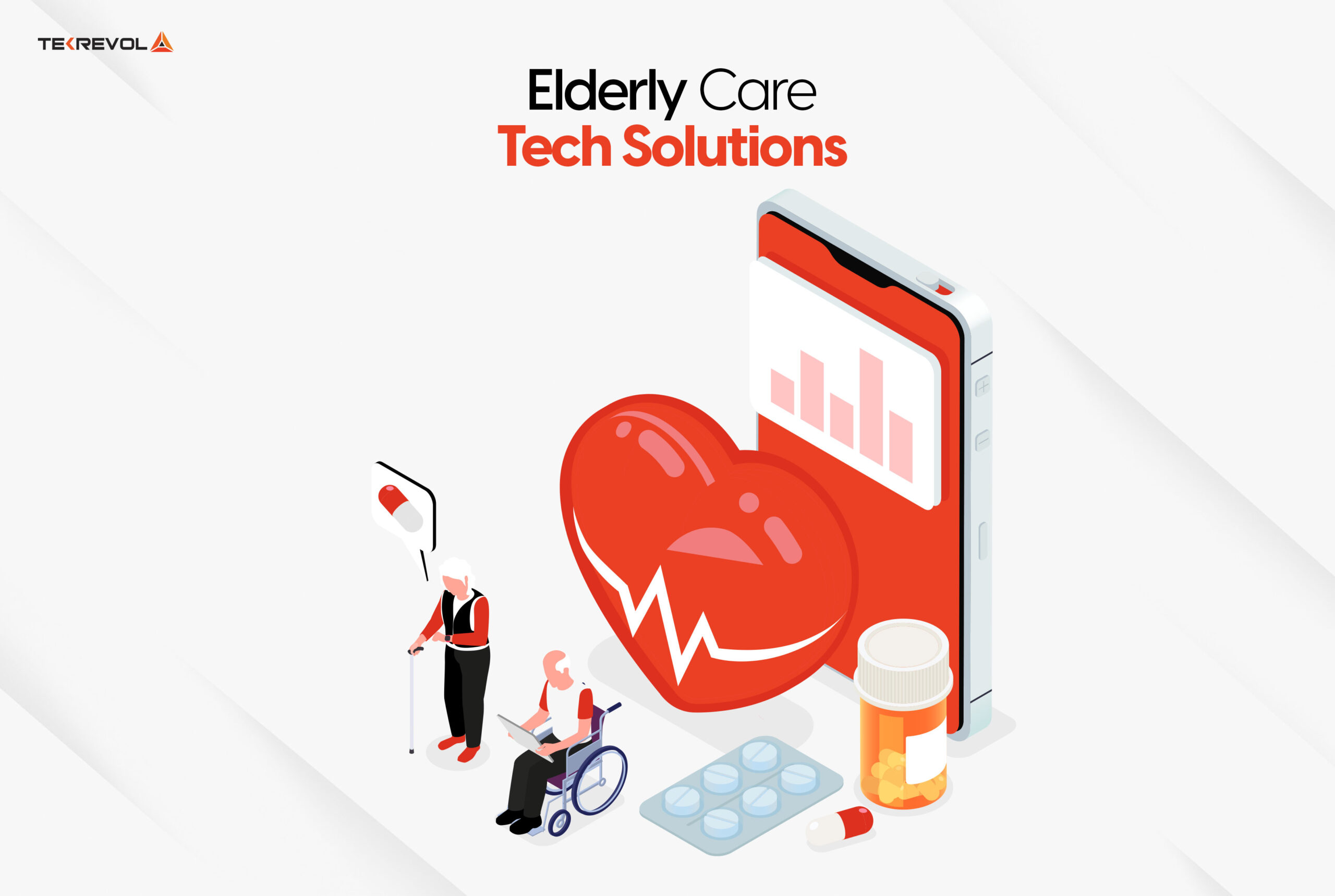
Elderly care tech solutions are improving the lives of the elderly. This is gaining momentum as the population ages, and a need for supporting technologies escalates. The likelihood of increased independence and safety levels is in itself driving up the demand for elderly care tech.
This market is an exciting opportunity for entrepreneurs to make a difference while tapping into a sector with significant growth potential.
Target Audience
Elderly care technology solutions help the elderly population, as well as carers and health care. It will appeal to families who seek the best ways to assist aging loved ones, to health facilities with plans for enhancing services offered in older adult settings, and to those elders who look to lead active, healthy, mobile lifestyles.
Success Stories
- GrandPad: Provides a tablet designed specifically for seniors, with a significant user base.
- LifeFone: Offers medical alert systems and fall detection devices, serving seniors for over 30 years.
- Honor: Connects caregivers with seniors in need, having raised over $100 million in funding.
Market Outlook
Elder care services market size is expected to reach $1.2 trillion by 2028, at a CAGR of 4.5%. The growth in this market can be attributed to the increased demand for elderly care solutions and the potential of technology to enhance senior living.
- Are You Ready to Scale Your Healthcare Business?
- Our expert healthcare app development company can help you build a scalable and secure app that meets your growing business needs.
9. AI in Drug Discovery
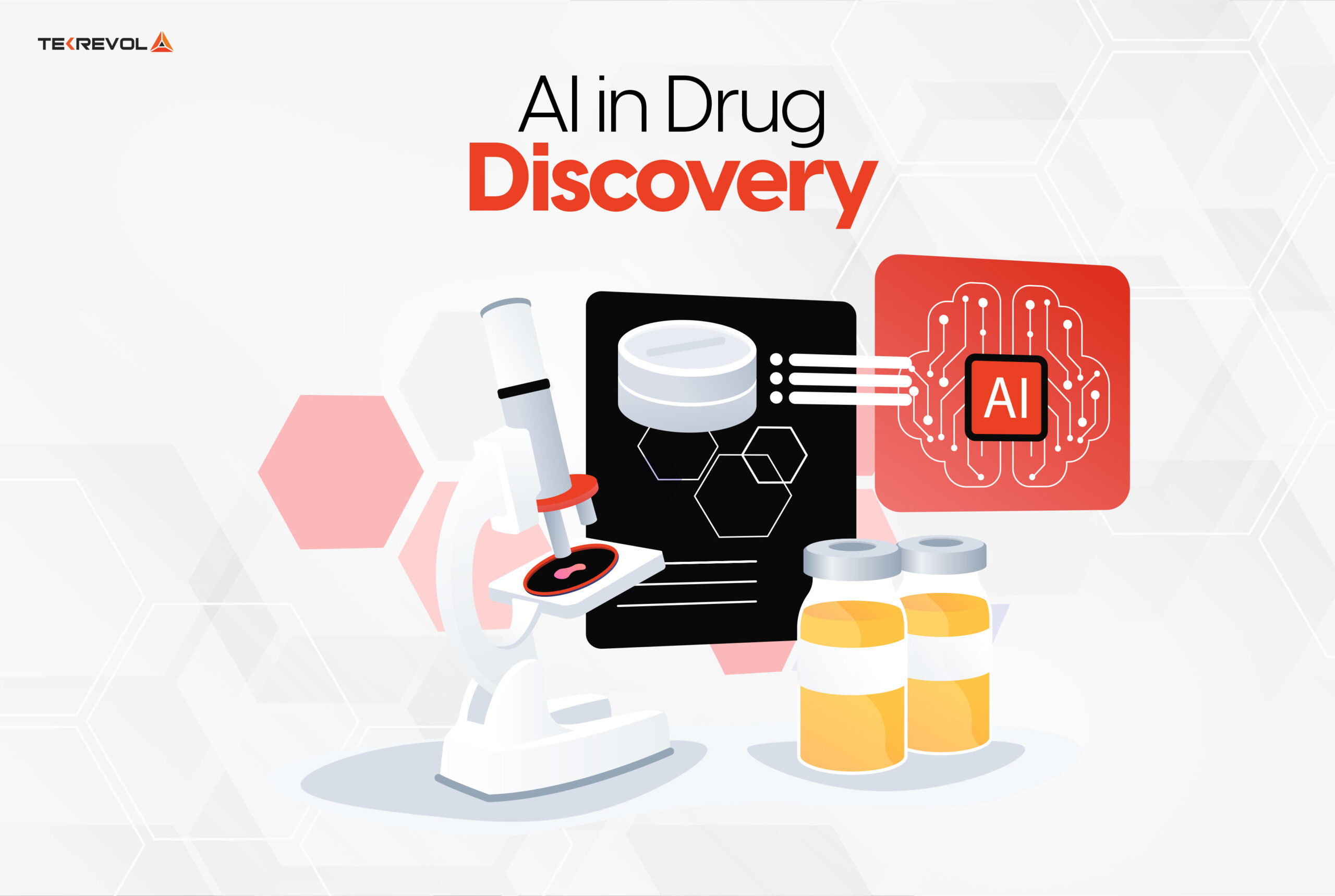
It takes well over a decade and billions of dollars in the United States to develop a new medicine that gets to market. Predictions of molecule behavior using AI and identification of the candidates are now carried out with much more accuracy.
The time and cost of undertaking research and development are way cut in this technology to the chagrin of competitors, thus making it something to write home about within the pharmaceutical industry.
For startups, AI in drug discovery is an opportunity to innovate and bring new treatments to market much faster, thus gaining a competitive advantage in a fast-moving field.
Target Audience
AI drug discovery solutions are ideal for pharmaceutical companies, biotech firms, and research institutions. They benefit researchers looking to accelerate drug development, companies aiming to reduce R&D costs, and healthcare providers seeking new treatment options.
Success Stories
- Atomwise: It is developing AI in small molecule drug discovery and partnering with some of the major pharmaceutical companies.
- BenevolentAI: It applies AI to understand complex diseases, develop novel drugs, and discover potential new drug targets.
- Insilico Medicine: The company focuses on AI for aging research and drug discovery and has considerable funding.
Market Outlook
The AI in drug discovery market is projected to reach $1.9 billion by 2024, with a CAGR of 25.8%. This growth highlights the potential for AI to revolutionize drug development and the opportunity for startups to lead in this innovative space.
10. Remote Patient Monitoring with IoT Devices
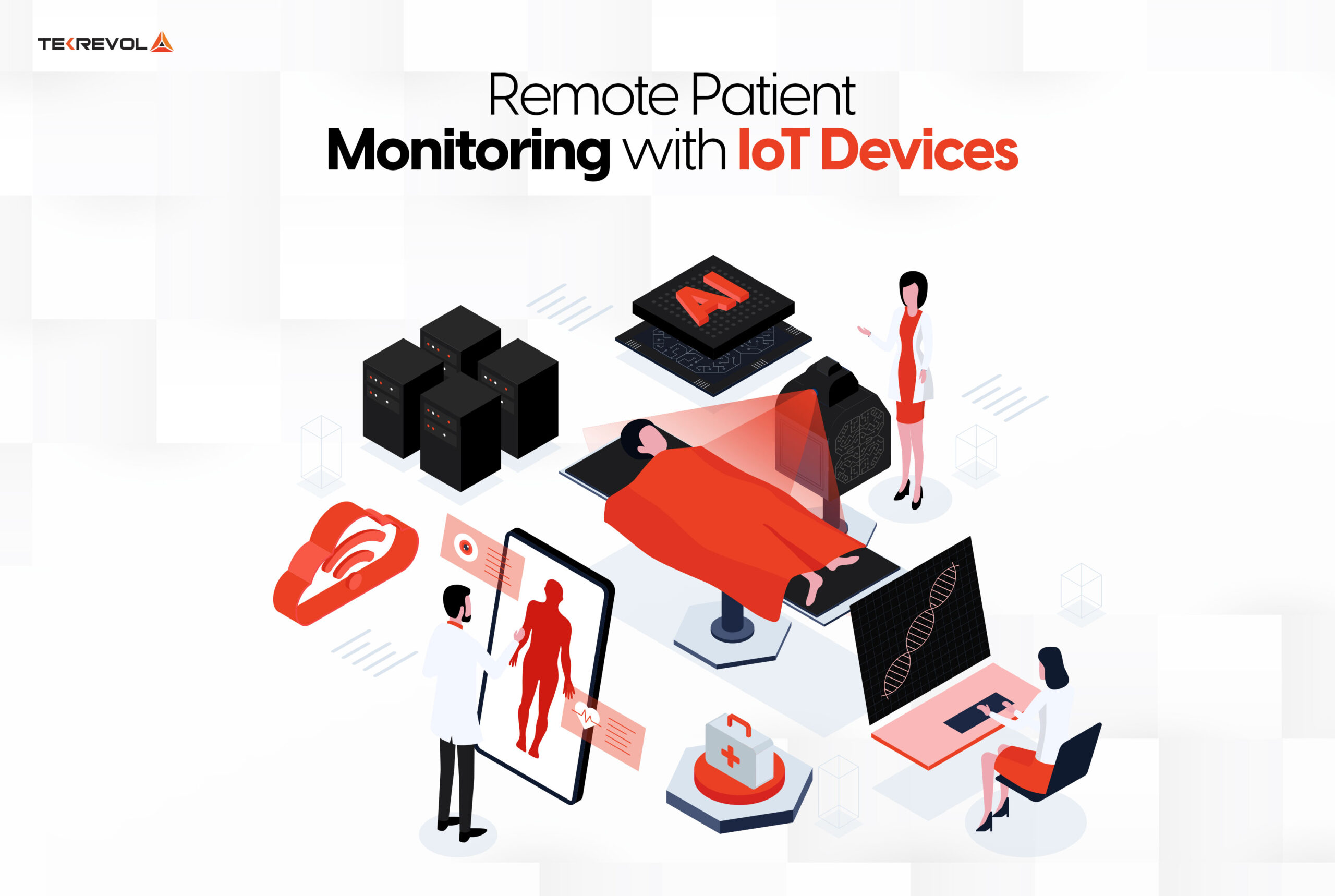
Remote patient monitoring is transforming healthcare by using IoT devices to track patients’ health data in real time. This increases continuous care outside of clinic settings, improves chronic diseases, and reduces hospital readmissions.
For startups, this sector offers a chance to develop solutions that add value to patient care, engaging them in a continually growing demand for remote services in healthcare.
Target Audience
These are the remote monitoring solutions appropriate for patients with chronic conditions, healthcare providers who want better patient outcomes, and insurance companies that can reduce costs. They help those who have to monitor their health often and organizations that want better care delivery.
Success Stories
- Philips Healthcare is a leading company in the healthcare technology sector, which offers remote monitoring solutions for various health conditions.
- Medtronic is a medical device leader that provides devices and platforms for remote cardiac monitoring.
- BioTelemetry: A company in the mobile and wireless medical technology space but very strong in the remote patient monitoring business
Market Outlook
The global remote patient monitoring market is expected to grow to $175.2 billion by 2027 at a CAGR of 19.5%. This growth would result from an increase in the demand for continuous care solutions and the scope for innovation in the space by new entrants.
11. At-Home Diagnostic Testing Kits
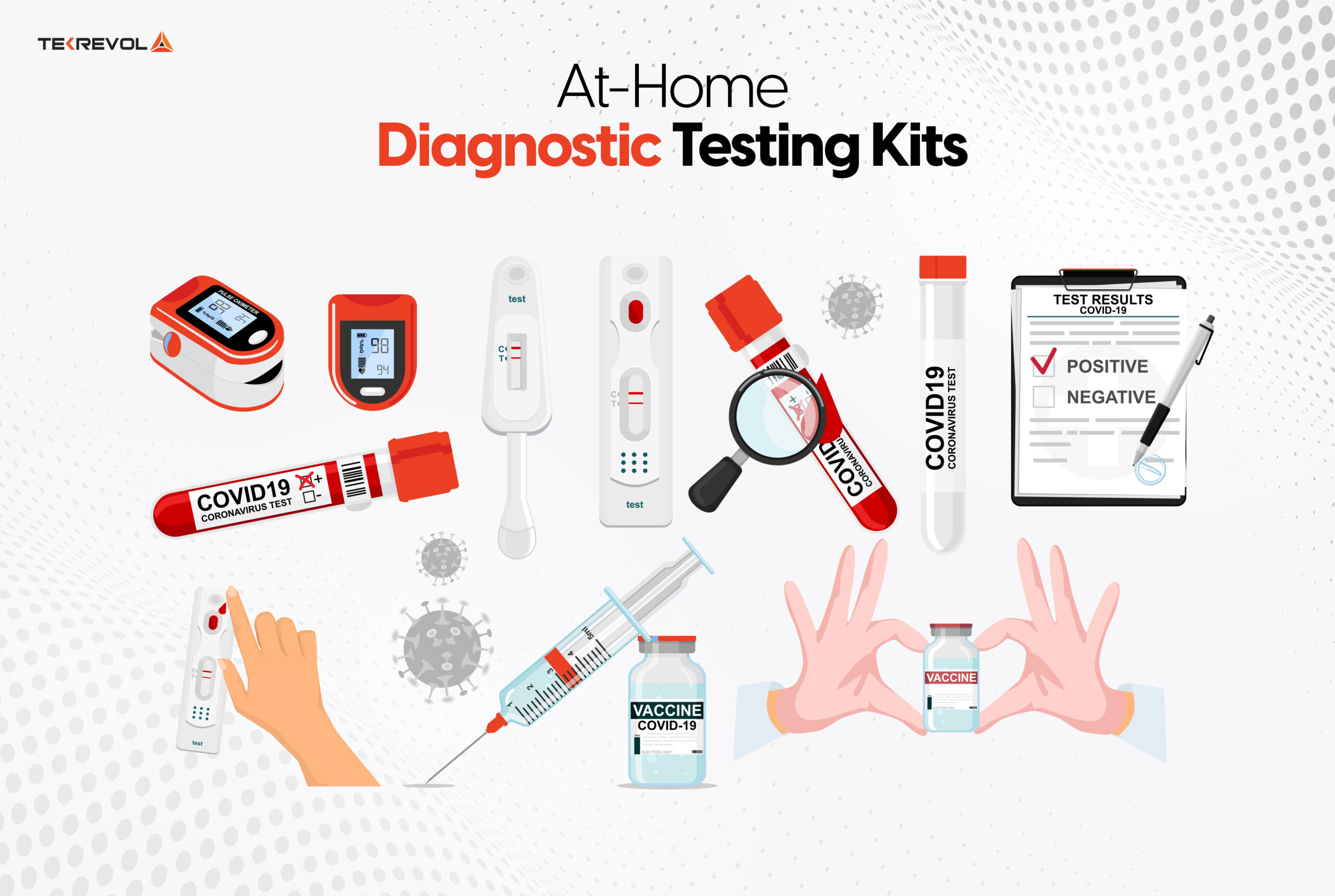
Diagnostic kits available for testing at home give people an opportunity to take charge of their health through private, discreet testing options. The user can perform their medical test from the comfort of their homes, and often, results appear on related mobile applications.
This is an enormous opportunity for start-ups to capitalize on this ever-growing demand for easy, accessible healthcare options away from clinics.
Target Audience
The at-home test kit will best fit the client for personal and discreet access to healthcare, chronic disease sufferers, and health service professionals willing to provide a diagnostic experience remotely. Consumers are desirous of on-the-convenience solutions, and business clients are seeking to broaden their service range.
SuccessStories
- Everlywell: Their many on-home tests will suit ease and private solution seeking the client.
- LetsGetChecked: They also serve clients in the UK and the US. Through health testing, they also come up with results after the test.
- MyLab Box: It works for in-home STD testing kits and partners with healthcare providers.
Market Outlook
The market of at-home testing will reach $45.58 billion by 2031, with a CAGR of 15.2%. The convenience in health care is bringing this market. Start-ups are able to come up with new models, so they gain this market as well.
12. Mobile Health Clinics
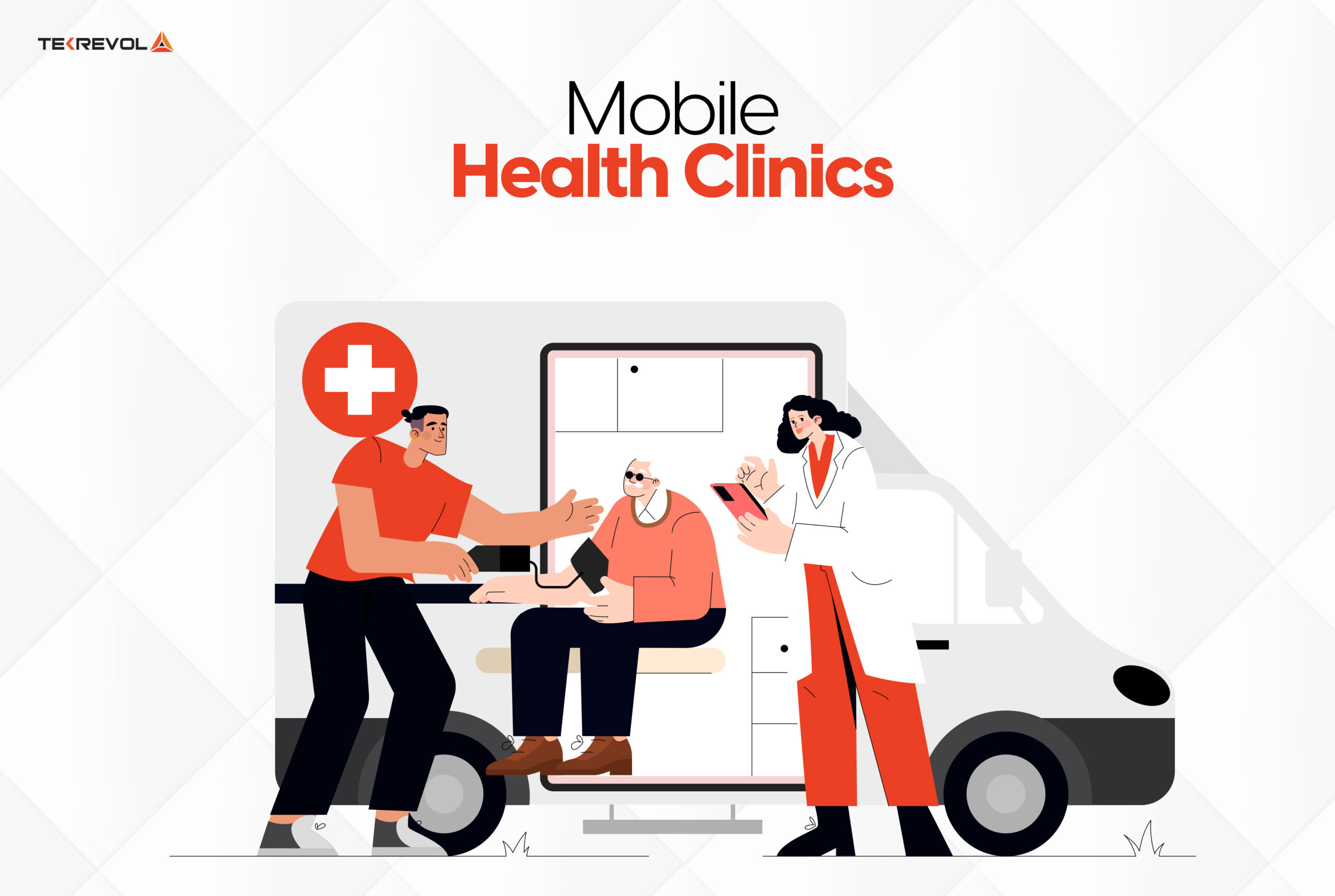
Mobile health clinics are transforming healthcare delivery by bringing essential services directly to underserved communities. These clinics provide medical care, screenings, and vaccinations, making healthcare accessible to those in rural or urban areas with limited facilities.
A mobile health clinic can be an excellent opportunity for a startup to address healthcare disparities and reach populations that would otherwise be overlooked by a traditional healthcare system. The creation of necessary medical equipment and healthcare professionals in mobile units is an effective and flexible healthcare solution for startups.
Target Audience
Mobile health clinics are perfect for the underprivileged, people in rural areas, and urban areas with a lesser supply of medical facilities. It assists populations who do not have access to scheduled healthcare services and programs seeking an improvement in the community’s health status.
Success Stories
- MobileMed: This facility offers mobile medical services for unreached groups of people. It also renders primary care and preventive healthcare services.
- Care-A-Van: It offers health services using mobile clinics to be brought to rural and difficult areas and focuses on the service of preventive care.
- Street Health: Brings health care to the homeless through mobile health services.
Market Outlook
The demand for mobile health clinics is expected to rise as healthcare professionals seek novel means by which they can reach underserved populations. This model also opens an opportunity for startups to make a significant social impact while addressing critical healthcare needs.
- Build a Winning Healthcare App Now!
- Our healthcare app development company specializes in building user-friendly, scalable, and secure apps that drive business growth.
13. Health and Wellness Coaching Platforms
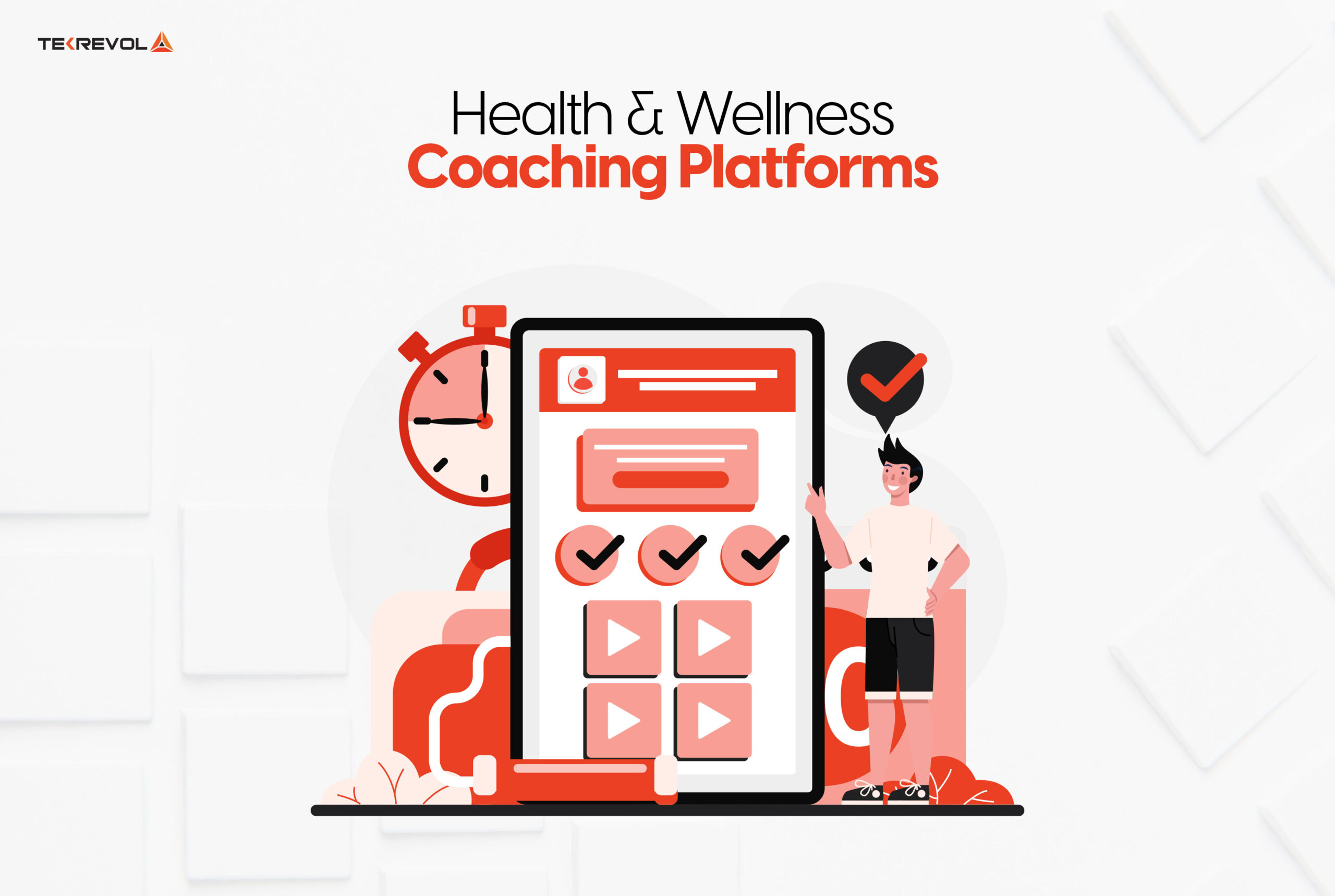
Health and wellness coaching platforms connect users with certified coaches who provide personalized guidance on nutrition, fitness, and lifestyle changes. As the focus on preventive healthcare grows, these platforms offer a valuable service by helping individuals achieve their health goals.
It offers the opportunity for startups to tap into the wellness market as the digital platform for virtual coaching sessions, tracking of progress, and online community support. Health coaching becomes both accessible and personalized using technology for vast audiences.
Target Audience
These are ideal for those seeking personalized health advice, athletes, and organizations that intend to offer wellness programs to their employees. They assist users who wish to become healthier through expert guidance and support.
Success Stories
- Noom: This is a digital health company that combines coaching, technology, and psychology to help the user achieve their health objectives.
- BetterUp: Personal coaching and mental health support for personal development, including professional development
- MyFitnessPal: Links a person to nutrition coaches to track progress and succeed in their health goals.
Market Outlook
Health and wellness coaching will grow as most of the individuals will focus more on preventive care and need specific solutions. This opportunity offers growth for startups by allowing innovation and value generation in the wellness industry.
14. Robotic Surgery
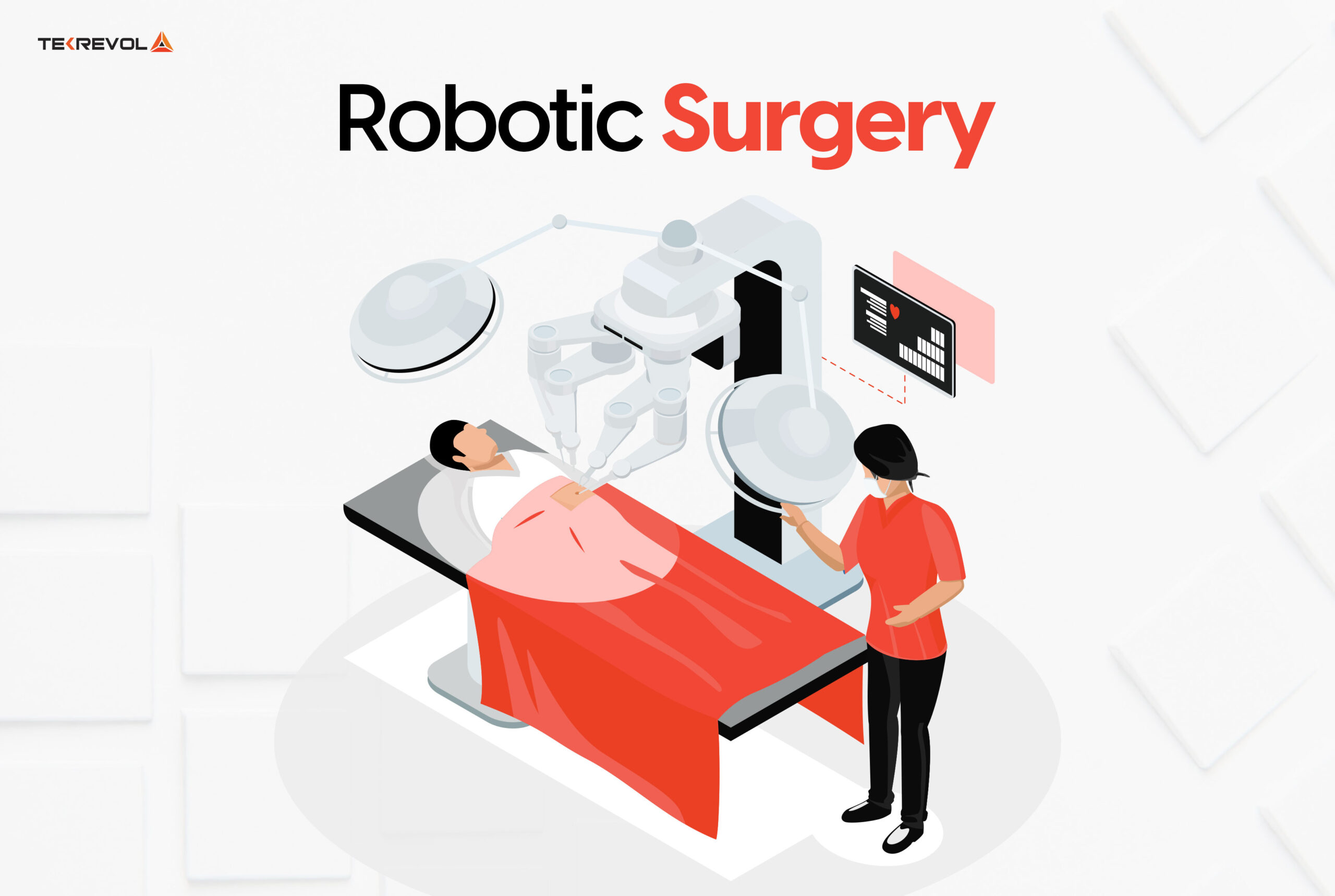
Robotic surgery is transforming surgical procedures by offering enhanced precision, flexibility, and control. These systems allow the surgeon to perform complex surgery with as much minimality as possible so as to be able to make better recoveries in less time.
For startups, robotic surgery is an opportunity to work on the development of a novel system or a constituent that could further extend capabilities in surgery. Even so, with the technology evolving fast, the practical applications in use may take many more years as regulatory and cost hurdles stand in the way.
Target Audience
Ideal for hospitals, surgical centers, and healthcare providers. Suitable for helping surgeons to improve surgical success and for patients who favor minimally invasive surgery methods.
Success Stories
- Intuitive Surgical: Known for its da Vinci Surgical System, a leader in robotic-assisted surgery.
- Medtronic: Developing robotic surgery systems to enhance surgical precision and outcomes.
- Stryker: Offers the Mako robotic-arm assisted surgery platform, focusing on orthopedic procedures.
Market Outlook
The robotic surgery market is forecasted to grow at compounded rates as technology advances and healthcare providers look for innovative ways to deliver better surgical care. Unless healthcare providers are fully trained and there is investment in infrastructure in the near term with the adoption of robotic systems by healthcare, it may not be possible to integrate such systems into daily surgical practice.
15. Virtual Health Assistants
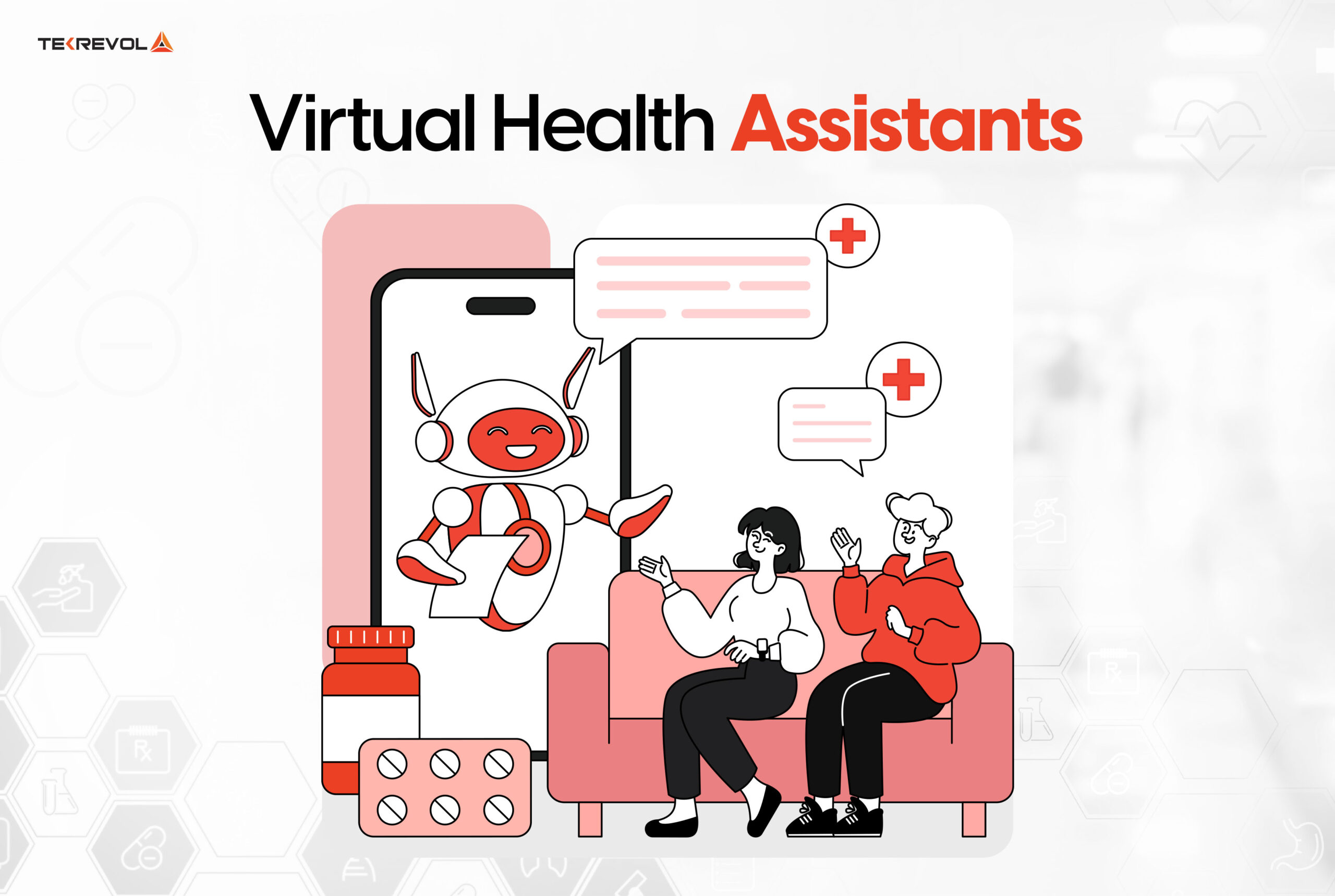
AI-driven virtual health assistants have brought ultra-personalized healthcare closer to the world. It provides personalized health advice, reminders, and support for patients with regard to their chronic conditions and improving adherence to medicines while, in general, providing them with information regarding their health.
Virtual health assistants promise to be one of the best opportunities for any startup seeking to engage its patients with support for delivering care by healthcare providers through personalized pathways.
Target Audience
Virtual health assistants are very convenient for patients who have to track long-term conditions and are ideal for any healthcare provider looking to upgrade their connection with patients to ensure proper care delivery. They are very instrumental for individuals who are keen on convenient health management systems and caregivers looking to manage health efficiently.
Success Stories
- Babylon Health is using AI to help people across the globe for free on health matters through virtual access and monitoring.
- Ada Health brings a personal assistant to smartphone applications, integrating artificial intelligence to help in symptom checking or advice.
- Your.MD: It is an AI-powered health information and advice platform designed according to individual needs.
Market Outlook
The virtual assistant in health is expected to grow as the demand for customized healthcare solutions increases while AI technology advances. These tools are integrated into the whole healthcare ecosystem, and this is a gateway for start-ups to innovate and improve care through technology.
- Take the First Step in Healthcare Tech!
- Partner with our expert healthcare app development company to turn your innovative idea into a successful healthcare business.
How to Launch a Successful Healthcare Business
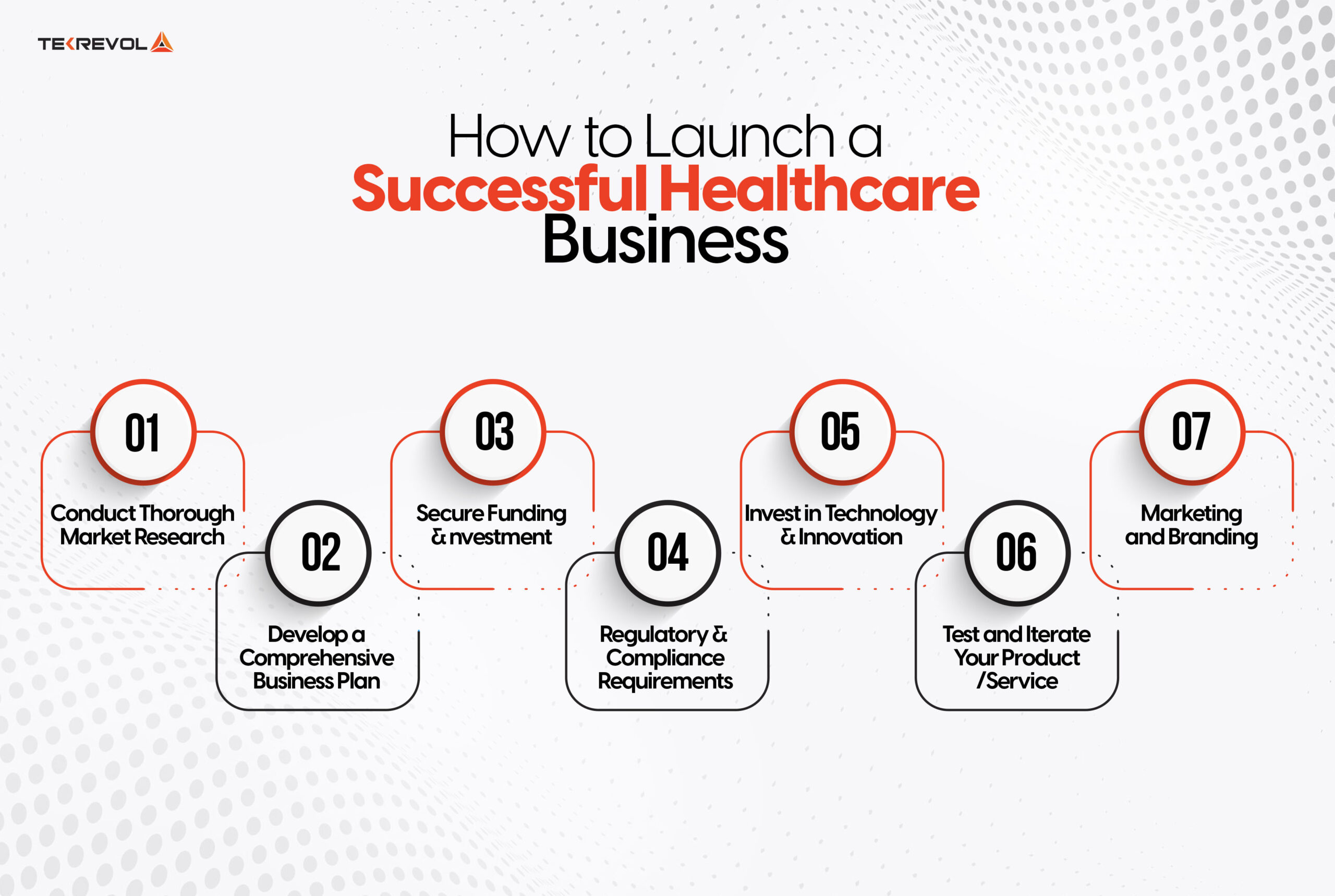
Now that you’ve finalized an innovative healthcare startup idea, the real challenge is launching it successfully. A great idea alone isn’t enough. You need to carefully plan each step to ensure that your medical business thrives in this competitive and highly regulated industry. Here’s a step-by-step guide to help you navigate the process.
-
Conduct Thorough Market Research
When conducting market research for your healthcare business, focus on a detailed competitor analysis. Look at your competitors’ strengths—maybe their patient scheduling systems are efficient, but their follow-up processes are slow.
Analyze where their solutions fall short. Are patients complaining about difficult-to-use apps or lack of personalized care? Understanding these gaps allows you to develop solutions that truly address unmet needs.
Key areas to focus on:
- Identify pain points in existing healthcare startups.
- Analyze competitors’ strong points, as well as areas where they lag.
- Study feedback from users to find what they struggle with in current medical business solutions.
-
Develop a Comprehensive Business Plan
A health business plan is more than just a financial roadmap. Consider developing a unique value proposition that speaks directly to patients or providers beyond defining a mission and vision.
For instance, if your venture is telemedicine, then what makes your service stand out? Is it getting to specialists quicker or more reasonably priced treatment options? Such differences ought to be translated into financial models and revenue streams to expect.
-
Secure Funding and Investment
Investors in healthcare startups would be interested in finding solutions addressing the biggest inefficiencies. Focus on how your solution has improved patient outcomes, cost reductions, or speeding diagnosis and treatment when writing your pitch. You should show that your business is scalable, especially if you’re using a technology like AI or telemedicine, and how you will change the global markets.
Some of the key types of investments to consider are:
- Venture capital firms focused on healthcare startups
- Angel investors with experience with health-related investments
- Government agencies and foundation funding opportunities
- Strategic partnerships with healthcare providers and organizations
-
Regulatory and Compliance Requirements
Healthcare regulations are complex and can vary by region, so understanding these is crucial. Compliance is far more than adherence to some laws such as HIPAA or GDPR: being ahead of the competition means being smart on compliance issues.
How well can your healthcare start-up share information among care providers without violating patient privacy? Medical devices would need to secure specific types of certification before the expedited market launch can take place.
-
Invest in Technology and Innovation
Partnering with a healthcare app development company or a mobile app development company ensures that you stay at the cutting edge of medical technology. Think about incorporating technologies like AI-driven diagnostics or wearables that monitor patient vitals in real-time.
The right tech partner can help you navigate these innovations while ensuring they align with healthcare regulations.
Key technology considerations:
- Ease of use: The application or software should be easy for the patient to use, as well as for the healthcare providers.
- Integration: Your solution should be integrated with other existing healthcare systems like EHR or practice management software.
- Data analytics: You should utilize the analysis of data to analyze the behavior of the patient and the outcomes of their treatments.
-
Test and Iterate Your Product/Service
Do not wait until you have your final version of a product to be tested before you roll out. Be flexible; test a small group of beta patients/providers, collect feedback, and improve aspects of the offering. What do you get? Feedback that says maybe the menu is too difficult to interpret or more options are in order; you refine all these by improving.
-
Marketing and Branding
Trust is everything in the healthcare business. Your marketing strategy needs to be credibility-focused. Do this through patient testimonials, partnerships with recognized healthcare institutions, or endorsements by medical professionals. Clearly point out how your solution contributes to improved patient care or provider efficiency and stands different from other healthcare startups.
- Launch Your Healthcare MVP in Weeks!
- Partner with our expert healthcare app development company to build a minimum viable product that meets your business needs.
Challenges in Implementing Business Ideas for Healthcare Entrepreneurship
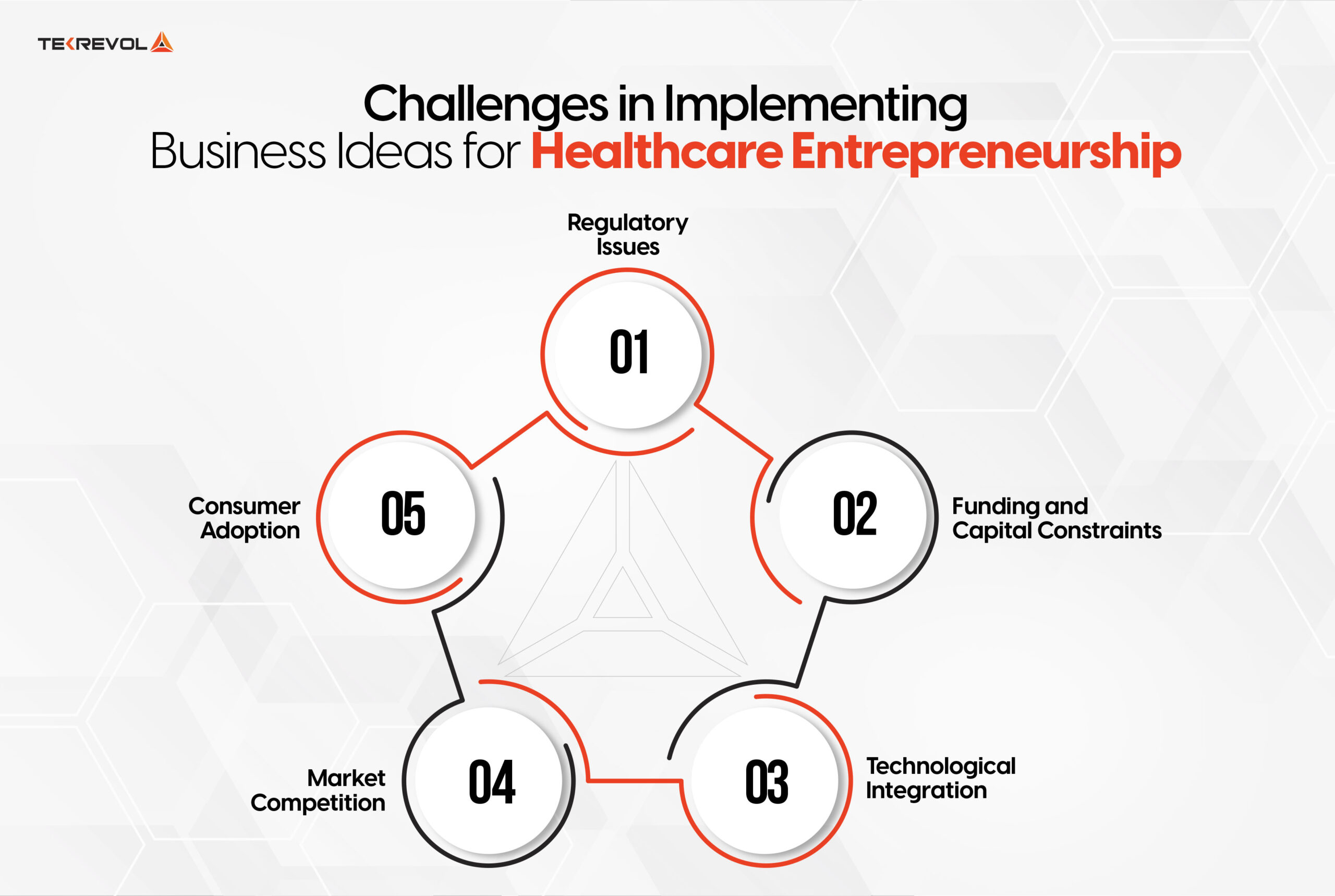
Although significant progress and ever-growing needs for healthcare services exist, there is an alarming 80% failure rate of healthcare startups. The healthcare business environment is complex, very regulated, and rapidly changing. Such a difficult environment cannot be sustained by new ventures. A few of the most crucial challenges and their solutions are given below.
Regulatory Issues
One of the biggest challenges a medical business startup faces is being compliant with healthcare regulations. This includes getting FDA approvals, HIPAA compliance requirements for the safety of the patient’s data, and much more. Without those certifications, your startup can’t operate legally, so there is delay and extra cost.
Tip: Engage healthcare compliance consultants early on to ensure your product is compliant with all regulatory requirements. This will likely save you from costly delays later on.
Funding and Capital Constraints
High initial capital requirements may even deter a significant number of healthcare start-ups. Extensive research and development, along with testing and gaining approvals, prove to be quite costly; managing expenses that relate to operations streamlines the cash flows.
Investors also become shy about investing more, considering that the product is too raw and the market value is still unknown. A traditional fund cannot be leveraged or secured without demonstrating market traction.
Here’s what you should do instead:
- Develop an attractive business plan with a real value proposition.
- Crowdfunding: consider options such as Kickstarter or Indiegogo.
- Consider presales to build up some early revenue and validate demand.
- Partner with established healthcare organizations.
- Provide subscription models for continuous cash flow.
Tip: Diversify funding streams by having licensing deals and consulting services to be as stable in the long run.
Technological Integration
Like any other industry, healthcare is transforming very fast. Any business healthcare startup has to keep pace with the rapid advancements in healthcare technology. AI and machine learning integration into seamless remote patient monitoring systems should maintain data security and interoperability between systems, which is still a major concern.
Tip: Partner with a reliable healthcare app development company to ensure your technology solution is secure, scalable, and easy to integrate with all the existing healthcare systems.
Market Competition
Healthcare is a saturated market. There are already set players in the industry, and thousands of new players are entering the market every year. Thousands of healthcare startups are launched every year to innovate and capture a share of this lucrative industry. More than 500 new healthcare startups were launched in the US alone in 2023, which indicates intense competition and a rapid pace of innovation in the sector.
In that respect, new startups should not only be unique in terms of technology but also ensure that trust and credibility are built in the eyes of patients and providers. That is made possible through unique solutions, excellent service delivery, and operations transparent enough for a competitive edge.
Tip: Identify your niche. Whether you specialize in individualized care to a patient or services offered, identify the niche and perform it with perfection while strengthening customer relations for mutual trust.
Consumer Adoption
Adoption by the consumer is the major challenge that health startups are facing. Many consumers tend to shy away from new technologies in the healthcare industry due to security issues regarding the data or lack of familiarity with the product. Educate users on how your solution will make them better through the improved experience in health care, with guaranteed secure storage and access to their information.
Tip: Provide free trials or demos to consumers to educate them on how your product will better their health experience while still being sure of the security of the data.
- Don't Let the Challenges Hold You Back!
- Partner with our expert healthcare app development company to overcome technical barriers and launch your MVP successfully.
How a Healthcare App Development Company Can Help
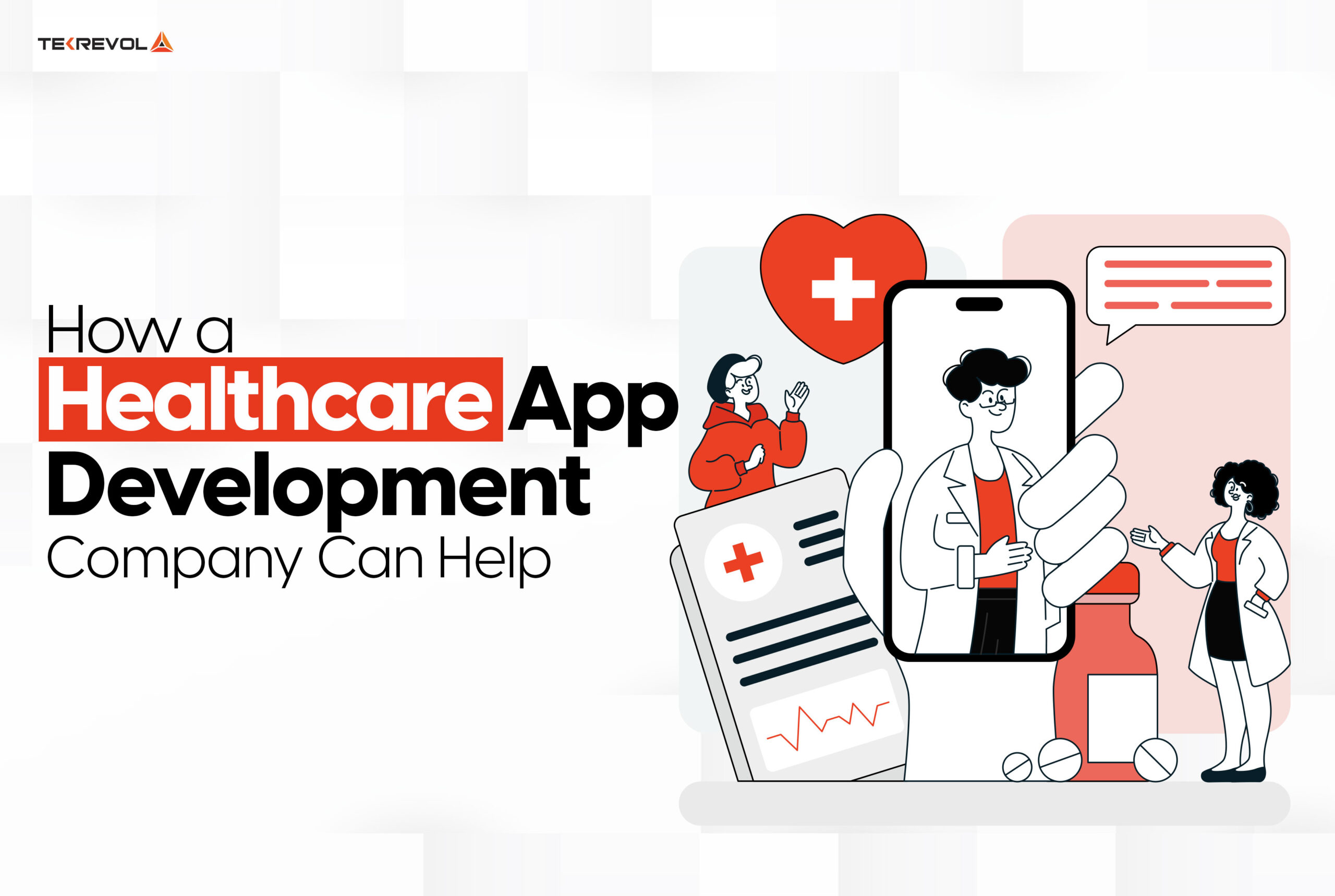
Turning your healthcare startup idea into reality requires dedication, expertise, and a fail-proof strategy. But this is easier said than done. Building a successful healthcare startup becomes an overwhelming task especially when talking about developing a robust, compliant healthcare application. It takes time and consumes resources, but it’s still at risk of failure if done the hard way.
Collaborate with a reliable technology partner such as TekRevol, one of the best health app development companies, and get your startup journey started quickly. Since its establishment in 2018, TekRevol has been transforming the healthcare industry with advanced technology solutions.
Their 150+ experienced medical app developers have been helping health organizations leverage novel technologies for best-in-class telemedicine features to ease patient care with custom healthcare app development services.
We have worked with many healthcare businesses, including healthcare startups, to develop innovative solutions to global health concerns. Below is a showcase of some of our most recent successful projects, including:
- Your Nurse: This is a telehealth platform for the provision of online consultations, virtual check-ups, and appointment scheduling. This way, patients and practitioners will experience near-zero downtime in telehealth services. (Read Complete Case Study Here)
- Kinect: AI-Powered Patient Care uses GPT-4 AI for aggregating messages in real-time, live monitoring of social content, and auto-activating engagements with patients. (Read Complete Case Study Here)
Whether to build a healthcare application or develop AI-based care integrated within your project, or whether to design a telemedicine platform, reach us to discuss your particular requirements, and our experts will help you create scalable, secure, and dependable healthcare solutions as per your unique business requirements.
- Turn Your Healthcare Idea into Reality!
- Partner with a mobile app development company that has the expertise to help healthcare startups like you turn their vision into a successful business.

 3059 Views
3059 Views February 14, 2025
February 14, 2025